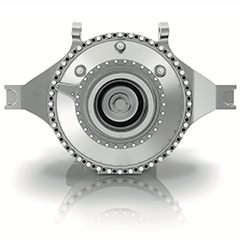Competitive gearboxes: electrification at high speed
With the launch of the SHIFT platform four years ago, ZF Wind Power changed the wind gearbox market in terms of flexibility, product lifetime and competition. Thanks to a design based on standardized building blocks, the platform offers high flexibility in gearbox development for next-generation turbine concepts. Currently, the platform has been extended with two new members: SHIFT 3k to the lower end of the torque scale and SHIFT 7k at the high end. Together with the 4k and 6k variants, the SHIFT platform contributes to the lowest levelized cost of energy in all wind areas.
Competitive design raising the torque density bar above 200Nm/kg
During its 40 years of activity in the wind market, ZF Wind Power has shipped 150 GW of gearboxes worldwide, of which 75% of today’s shipments are based on the modular platform design. With a torque range of 2000-8000 kNm, all onshore and offshore wind sites can be covered. Where the
SHIFT 7k variant with a maximal torque up to 8000kNm addresses the high power and high output onshore segments as well as dedicated offshore markets, the SHIFT 3k variant was added to the product family specifically to cover the demand in view of low to very low wind sites to boost annual energy production. With this broad torque range, ZF Wind Power SHIFT gearboxes enable cost-efficient turbine designs for all markets with a wind power density starting from 125W/m2 up to 500W/m2.
In terms of torque density, the 3k and 7k siblings in the product family clearly raise the bar in their segments, with the 7k even surpassing the 200Nm/kg mark. This step-up in torque density was made possible by continuously advancing the state-of-the-art in gearbox components and materials. To achieve an overall ratio of 200, the 7k variant comes with 4 stages in total, of which the first 2 stages are equipped with a higher number of planets than its 4k and 6k predecessors. Optimization of load sharing in these multi-planet stages is the ‘fine art’ of gearbox design combined with selective assembly of components in the assembly process.
Competitive gearboxes: electrification at high speed
With the launch of the SHIFT platform four years ago, ZF Wind Power changed the wind gearbox market in terms of flexibility, product lifetime and competition. Thanks to a design based on standardized building blocks, the platform offers high flexibility in gearbox development for next-generation turbine concepts. Currently, the platform has been extended with two new members: SHIFT 3k to the lower end of the torque scale and SHIFT 7k at the high end. Together with the 4k and 6k variants, the SHIFT platform contributes to the lowest levelized cost of energy in all wind areas.
Competitive design raising the torque density bar above 200Nm/kg
During its 40 years of activity in the wind market, ZF Wind Power has shipped 150 GW of gearboxes worldwide, of which 75% of today’s shipments are based on the modular platform design. With a torque range of 2000-8000 kNm, all onshore and offshore wind sites can be covered. Where the
SHIFT 7k variant with a maximal torque up to 8000kNm addresses the high power and high output onshore segments as well as dedicated offshore markets, the SHIFT 3k variant was added to the product family specifically to cover the demand in view of low to very low wind sites to boost annual energy production. With this broad torque range, ZF Wind Power SHIFT gearboxes enable cost-efficient turbine designs for all markets with a wind power density starting from 125W/m2 up to 500W/m2.
In terms of torque density, the 3k and 7k siblings in the product family clearly raise the bar in their segments, with the 7k even surpassing the 200Nm/kg mark. This step-up in torque density was made possible by continuously advancing the state-of-the-art in gearbox components and materials. To achieve an overall ratio of 200, the 7k variant comes with 4 stages in total, of which the first 2 stages are equipped with a higher number of planets than its 4k and 6k predecessors. Optimization of load sharing in these multi-planet stages is the ‘fine art’ of gearbox design combined with selective assembly of components in the assembly process.
To read the full content,
please download the PDF below.



























